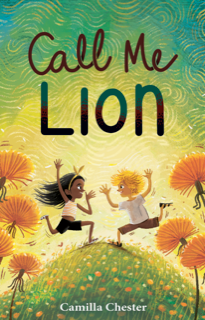WRITING Self-published success stories (part 2)
In the second part of our feature on self-published authors and their publishing journeys, Fran Benson talks to Camilla Chester and Catherine Holland-Bax.
Camilla Chester
Camilla (pictured right) on her recent Scottish tour for her traditionally
published novel Call Me Lion, with Sarah Broadley
Camilla has been writing all her life but began to take it more seriously in 2010. She did a two-year diploma in creative writing and literacy with the OU and became a SCBWI member and volunteer. She has written five children’s novels, a handful of adult short stories and is currently working on an adult and a children’s novel. She also writes for an online school resource company called Serial Mash and has eight short stories with them.
It was never her intention to self-publish. However, when she was a finalist in a writing competition with the National Literacy Trust, it gave her the validation she needed. Had she actually won the competition, her book would have been published by Bloomsbury. The commissioning editor assured her it was good enough to publish, so she went ahead and did it herself.
Camilla chose a company to self-publish the book which made it a simple process, but the difficulty was in marketing and selling the book, with distribution being the hardest thing.
Through it all she never gave up on being traditionally published. She is now agented by Veronique Baxter at DHA and her first traditionally published children’s novel, Call Me Lion, came out in June with Firefly Press.
“The best thing about self-publishing is having a product in which to build your platform as a children’s author. You can continue onwards with your career rather than waiting to be ’chosen’ by an agent and then again by a publisher. It removes the pain of submission and rejection and gives you full autonomy over your future.
Camilla’s advice:
- Make sure that what you’re self-publishing is good quality: well written and edited with a good cover. Your book should be able to sit alongside traditionally published books and nobody should be able to tell the difference.
- “I’m proud of my self-published books, but now that I am traditionally published, I realise they are not as professionally edited as Call Me Lion. It’s a whole other level, so don’t rush the process.”
@camillacauthor — all handles
https://linktr.ee/camillacauthor — all links
Catherine Holland-Bax
Catherine Holland-Bax with her favourite Viking horse, Fleygur
Catherine has been writing since childhood and often used storytelling in her earlier career — to communicate, inspire and lead.
She self-published Little Viking Horse in 2021 after graduating from the Golden Egg Academy where she developed her craft. Little Viking Horse was her first novel, and she is now close to finishing a second (unrelated) novel, and has a plot ready for a Little Viking Horse sequel.
Catherine was always open to the idea of self-publishing – her main goal being to get the story out there. Initially she submitted to two publishers and queried five agents. One of the publishers was interested but ultimately it didn’t lead to an offer. However, the feedback she received from publishers and Golden Egg reassured her that her novel was good enough to self-publish.
She already had an existing market for the book — through a long standing ‘Little Viking Horse’ Facebook following, and the support of the Icelandic Horse Society. This combined with the thought of possibly endless submissions, the long run-in time from contract to publication, and the possibility that a publisher might want to take the story in a direction she didn’t want, were all reasons she decided to self-publish.
Catherine hit her first 1,000 books sold within 10 months – a number which is considered successful for a first book even in traditional publishing
“I was unprepared for the number of pre-orders I got, and had to get my dad in to help with the postage and packing! I broke even before publication day. Most of my sales have been direct — through my website, at a few events, and even at my front door. I learned that it wasn’t as hard as I thought it would be, and that I need to spend more on proofreading!”
She hit her first 1,000 books sold within 10 months – a number which is considered successful for a first book even in traditional publishing. Aside from retaining creative control, she has seen a much bigger return per book, compared with traditional publishing.
Catherine is planning to send the book to some German publishers soon to see if she can get a foreign rights deal, and is writing and planning her next books.
“I’ve not regretted for one second choosing to self-publish. It’s been rewarding and liberating. I think more writers should consider it”.
Catherine’s advice:
- Know what you want to achieve.
- Know your target audience and how to reach them.
- You don’t have to do everything that others do — do what works for you.
Twitter: @Cat_HollandBax
(Also on FB and Instagram as Catherine Holland-Bax)
Website: eponawise.com
You can also follow Little Viking Horse himself on Facebook!
*Images courtesy of Catherine Holland-Bax and Camilla Chester
*
*














No comments:
We love comments and really appreciate the time it takes to leave one.
Interesting and pithy reactions to a post are brilliant but we also LOVE it when people just say they've read and enjoyed.
We've made it easy to comment by losing the 'are you human?' test, which means we get a lot of spam. Fortunately, Blogger recognises these, so most, if not all, anonymous comments are deleted without reading.